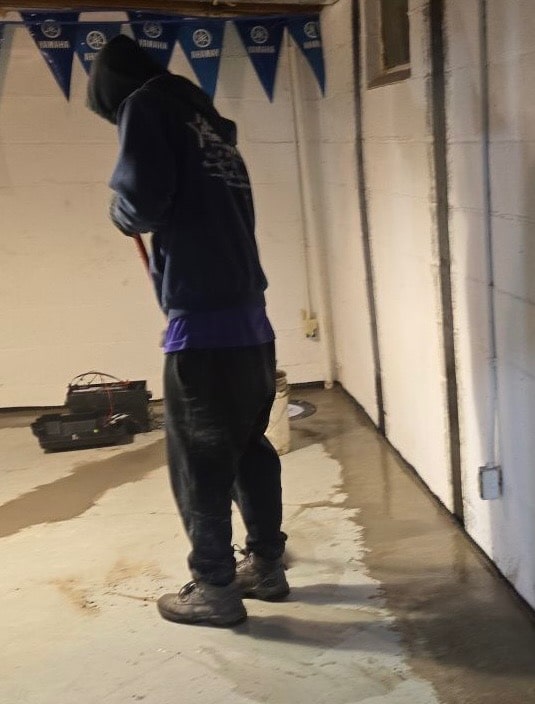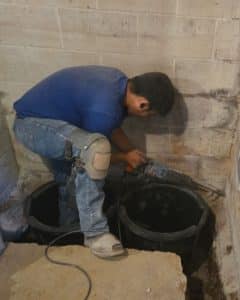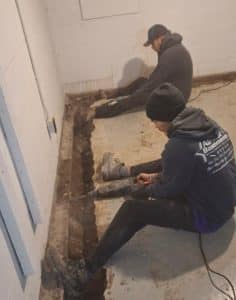
As a homeowner, the thought of basement waterproofing might have crossed your mind. You’re faced with two main options: the DIY route, which could save money but demands your time and effort, or hiring a professional service that guarantees expertise but at a higher price. It’s a balancing act, isn’t it? But what if there’s more to take into account than just cost and convenience? Let’s explore this further and see if we can’t find a solution that fits your needs perfectly.
Understanding Basement Waterproofing
A surprising number of homeowners tend to overlook the importance of basement waterproofing. You might think it’s an unnecessary expense or a project for another day, but it’s essential for maintaining your home’s structure and value.
Waterproofing your basement is all about preventing water from making its way into your home. It’s not just about dealing with the aftermath of a flood or a heavy storm. It’s about taking a proactive approach to home maintenance.
Waterproofing can protect your home from the damaging effects of moisture, such as mold, mildew, and structural decay.
Don’t underestimate the power of water. It can seep through cracks in your foundation, sneak beneath your flooring, and even creep up your walls. Without proper waterproofing, you’re leaving your home vulnerable to a host of issues.
Understanding the importance of basement waterproofing is the first step. The next is learning how to do it yourself.
But before you jump into that, it’s useful to know what you’re up against. So take the time to inspect your basement, identify potential problem areas, and plan your approach. It’s well worth the effort.
The Basics of DIY Waterproofing
Now, let’s shift gears to understanding the basics of DIY waterproofing.
You’ll need to get a grasp on the variety of waterproofing materials available and learn the right techniques to apply them.
It’s not just about slapping on some sealant; it’s about knowing what works best for your basement and how to apply it for maximum effect.
Understanding Waterproofing Materials
Delving into the world of waterproofing materials, you’ll find a vast array of options available to you. You may feel overwhelmed, but don’t worry. It’s important to understand each type to guarantee a successful DIY project.
First, you’ve got concrete sealers. These are typically used for sealing concrete walls and floors, providing a water-resistant barrier. They’re easy to apply and relatively inexpensive, making them popular for DIYers.
Next, you’ll find waterproofing paints. These are thicker than regular paints and form a seal over the surface they’re applied to. Although they’re not as durable as other options, they’re a quick fix for minor leaks.
Then there’s the waterproofing membrane, a sheet-like substance that’s adhered to your basement walls to prevent water ingress. This is more complex to install but offers superior protection.
Finally, you have the option of waterproofing primers. These are applied before painting and form a water-resistant layer beneath the paint.
Each material has its pros and cons, and what’s best for your situation depends on the extent of your water problem, your budget, and your DIY skills.
Understanding these materials is the first step towards a dry and comfortable basement.
Proper Application Techniques
Initiating a DIY waterproofing project requires more than just selecting the right materials; it demands a proper understanding of application techniques. Without the correct approach, even the best waterproofing products can fail to protect your basement from moisture and water damage.
Firstly, you need to clean the area to be waterproofed. Dust, dirt, and debris can impede adhesion of the waterproofing material. Use a brush to clean off loose particles then vacuum to achieve a clean surface.
Next, prepare your chosen waterproofing product as per manufacturer’s instructions. Many products require mixing before application; don’t skip this step.
Afterwards, apply it evenly across the surface using a brush or roller. Start from the bottom and work your way up to guarantee full coverage.
Pros of DIY Basement Waterproofing
Taking on basement waterproofing yourself can offer a few significant advantages.
You’re likely to save some serious cash, have the flexibility to schedule the work around your own timetable, and tailor the project to your specific needs.
Let’s explore how these benefits can make DIY basement waterproofing a compelling choice for you.
Cost-Effective Solution
Without a doubt, one of the most significant benefits of DIY basement waterproofing is its cost-effectiveness.
You’re not paying for a professional’s time, expertise, or overhead costs. You’re merely investing in the materials and tools needed to get the job done.
When you tackle this project yourself, you’re in control of the budget. You can shop around for the best prices on waterproofing products and tools, taking advantage of sales and discounts that professionals may not pass on to you.
You’re also not obligated to pay for any unnecessary extras that a contractor might try to upsell.
However, it’s essential to recognize that while DIY waterproofing can save you money upfront, it could potentially cost more in the long run if not done correctly.
The last thing you want is to have to redo the project or, worse, hire a professional to fix your mistakes.
Consequently, before you immerse yourself in this DIY project, make sure you thoroughly research and understand the process.
Invest in quality materials and tools, and don’t cut corners.
With careful planning and execution, DIY basement waterproofing can certainly be a cost-effective solution.
Flexibility in Timing
Another significant advantage of undertaking a DIY basement waterproofing project is the flexibility it offers regarding timing.
You’re not at the mercy of a contractor’s schedule, which can often be packed, leading to delays in starting or completing your project. Doing it yourself means you can start as soon as you’re ready, and take as much time as you need.
You can work on the project during your free time, weekends, or even during your vacation. You have complete control over the pace, allowing you to carefully plan each step and guarantee the best results.
This way, you’re not rushing through important tasks to adhere to a professional’s time frame. Furthermore, if you stumble upon unexpected issues, you can pause the project, reassess your plan, and find the best solution without pressure.
It’s all about your convenience and comfort. You’ll also have the chance to learn along the way, improving your home improvement skills.
However, remember that while you have the freedom to set your schedule, it’s important not to procrastinate. A prolonged project might make your basement unusable for an extended period.
Personalized Approach
One of the most rewarding aspects of a DIY basement waterproofing project is the personalized approach you can take. This isn’t just about choosing the color of your sealant. It’s about understanding the unique needs of your own basement and tailoring your waterproofing efforts to meet them.
You know your home better than anyone. You’re aware of its quirks, its strengths, and its weaknesses. For instance, you might know that one corner of your basement tends to get damper than the rest, or that the walls are more porous in certain areas. This inside knowledge allows you to focus your efforts where they’re most needed, rather than applying a one-size-fits-all solution.
A DIY project gives you the freedom to experiment with different waterproofing techniques, materials, and products. You can opt for more environmentally friendly solutions if that’s important to you, or invest in higher-end materials for a more durable finish.
You’re in control of every decision, every step of the way. Doing it yourself also means you can work at a pace that suits you, taking the time to do a thorough job without the pressure of a professional crew waiting on you.
This personalized approach is one of the key advantages of DIY basement waterproofing.
Cons of DIY Basement Waterproofing
Despite the appeal of saving money, taking on basement waterproofing as a DIY project can have its fair share of challenges. First, the process can be physically and mentally demanding. You’ll need to spend a significant amount of time researching, planning, and executing the project, which can be exhausting if you’re not used to this kind of work.
Secondly, you may lack the specialized tools and knowledge required for an extensive waterproofing job. Without proper experience, you might miss important signs of potential water issues, or apply incorrect solutions, leading to future problems.
Mistakes in DIY waterproofing can also result in significant long-term costs. If you don’t correctly identify and address all water entry points, you could face expensive repairs down the line. Furthermore, a poorly done job might negatively impact your home’s overall value.
Additionally, DIY waterproofing doesn’t come with any guarantees. If any issues arise post-project, you’ll have to shoulder the burden of rectification. In contrast, professional services often offer warranties, providing you with a safety net.
Lastly, the safety risks can’t be ignored. From mold exposure to physical injuries, the hazards associated with DIY waterproofing can be considerable. It’s important to weigh these cons before diving into a DIY project.
An Overview of Professional Waterproofing Services
Venturing into the territory of professional waterproofing services, you’ll find a contrast to the DIY approach. These aren’t weekend warriors with a penchant for home improvement. These are seasoned professionals with years of experience and thorough training.
When you hire a professional service, you’re not just paying for labor. You’re investing in a team that’s well-versed in advanced techniques, up-to-date with the latest waterproofing materials, and equipped with specialized tools. They’ve a keen eye for identifying potential problem areas that you might overlook.
They’re not just slapping on a coat of waterproof paint and calling it a day. They start with a thorough inspection, detecting even the smallest signs of water intrusion. They then devise a detailed plan tailored to your basement’s specific needs. This could involve exterior waterproofing, interior water control, or a combination of both.
They’ll consider factors like your home’s age, the soil type, and the level of groundwater in your area. After the work is done, most professional services will follow up with regular maintenance checks.
In essence, professional waterproofing services bring a level of expertise and precision that’s hard to match with a DIY approach.
Benefits of Hiring Professional Services
After understanding the precision and expertise professional waterproofing services bring to the table, you might be wondering about the specific advantages of hiring them.
Let’s explore some of the key benefits.
First off, professionals have the knowledge and experience to accurately diagnose the root cause of your basement’s water problem. They don’t just fix the symptom, they tackle the issue at its source.
This means you’re not just getting a quick fix, but a long-term solution.
Next, professionals use superior equipment and products. They’ve got access to industrial-grade waterproofing materials that aren’t available to the general public.
This leads to a higher quality, more durable waterproofing job.
Third, there’s the convenience factor. Waterproofing a basement is a hefty task. It’s time-consuming, labor-intensive, and can be quite messy.
When you hire a professional, you’re freeing up your own time and energy.
Lastly, many professional services offer warranties on their work. If there’s a problem down the line, they’ll come back and fix it at no extra charge.
This isn’t something you’d get with a DIY job.
Drawbacks of Professional Waterproofing Services
While professional waterproofing services offer numerous benefits, they do come with a few drawbacks you should consider.
To begin with, you may not have complete control over the project’s schedule. Professionals often juggle multiple jobs at once, which can lead to delays. Although they’re generally flexible, you might’ve to adjust to their timetable.
In addition, there’s a risk of dealing with unscrupulous contractors. Some might under-deliver, or use subpar materials to cut costs. To avoid this, you need to do your due diligence. Check their credentials, read reviews, and ask for references. This is a time-consuming process, but it’s necessary to guarantee you’re getting your money’s worth.
Lastly, you may face communication issues. The technical jargon used by professionals can be confusing. You may not fully understand the process, which can lead to unrealistic expectations or dissatisfaction with the results. Consequently, it’s crucial to find a service provider who can explain things clearly.
Bear in mind these potential drawbacks before hiring a professional service. It’s about balancing convenience and quality against these potential issues. It’s always about making an informed decision that suits your specific needs and situation.
Cost Comparison: DIY vs. Professionals
Often, one of the key deciding factors between going the DIY route or hiring professionals for basement waterproofing is cost.
You’re probably wondering, what’s the bottom line?
Doing it yourself can indeed save you some cash upfront. You’ll need to buy materials like sealants, drainage pipes, and maybe some tools. These costs can range from a few hundred to a thousand dollars, depending on the severity of your basement’s water issues.
Remember, though, your time is also valuable. You’ll need to factor in the hours you’ll spend researching, preparing, and executing your project.
On the other hand, hiring a professional service can be more costly upfront, often running between $2,000 to $10,000, depending on various factors like the size of your basement and the complexity of the problem.
That’s a big range, isn’t it? But, remember, you’re paying for their expertise, equipment, and guarantee of a job well done. They’ll likely finish the task more quickly and efficiently than you could on your own.
In the end, the choice between DIY and professional services isn’t just about dollars and cents. It’s about balancing cost, time, expertise, and peace of mind.
Making Your Decision: DIY or Professionals?
Weighing the pros and cons, it’s down to you to decide which route to take for your basement waterproofing: DIY or hiring professionals.
Both paths have their own benefits and drawbacks, and what works best depends largely on your specific situation.
If you’re handy, have ample time, and the right tools, going the DIY route might be a cost-effective option for you. It gives you the satisfaction of doing the job yourself.
But remember, waterproofing isn’t a simple painting project. It requires a good understanding of your home’s construction and the right techniques to guarantee water won’t seep in. If done incorrectly, it could lead to more costly repairs down the line.
Hiring professionals, on the other hand, may cost more upfront, but it comes with the peace of mind that the job is done right.
Professionals have the training, experience, and tools to handle any challenges that may arise. Plus, most professional services come with a warranty, giving you an extra layer of protection.
In the end, the choice is yours. Consider your budget, time, skills, and the complexity of your basement’s situation before making your decision.
In the end, it’s your call. Weigh the cost and effort of the DIY route against the expertise and assurance offered by the pros. Picture it as a seesaw, balancing your budget and time with the peace of mind you seek against water damage. Remember, while DIY may save pennies today, professional services could potentially save dollars tomorrow. The choice is yours, so make it wisely, considering your unique situation and needs.














